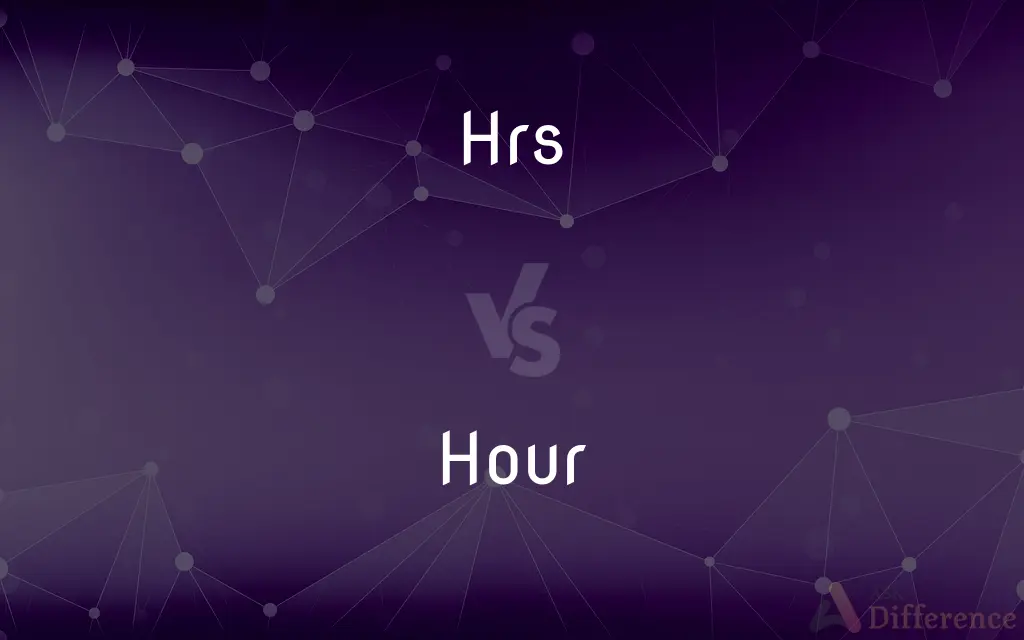Hrs vs. Hour — What's the Difference?
By Urooj Arif & Fiza Rafique — Updated on April 20, 2024
"Hrs" is an abbreviation for "hour" used mainly in informal contexts or notations, while "hour" is the full term, commonly used in formal writing and speech.

Difference Between Hrs and Hour
Table of Contents
ADVERTISEMENT
Key Differences
"Hrs" stands for "hours" and is typically used in shorthand writing or quick notes, whereas "hour" is the complete word used in standard English communication.
In business emails or professional documents, "hour" is preferred for clarity and professionalism, while "hrs" might appear in informal settings or internal communications.
On digital platforms like social media or text messaging, "hrs" is often used to save space or time, on the other hand, "hour" is used in academic and official contexts to maintain formality.
When creating official reports or presentations, using "hour" helps maintain a tone of seriousness and accuracy, whereas "hrs" might be seen in more casual, summarised data displays.
In instructional content, such as tutorials or courses, "hour" is generally used to ensure understanding, while "hrs" might be found in quick reference guides or notes.
ADVERTISEMENT
Comparison Chart
Usage Context
Informal, shorthand
Formal, academic
Writing Style
Abbreviated
Full word
Preferred Medium
Texts, quick notes
Official documents, books
Tone
Casual
Professional, serious
Example
24 hrs
24 hours
Compare with Definitions
Hrs
Abbreviation for "hours."
The store is open for 10 hrs today.
Hour
Often used in formal contexts.
The lecture will take an hour.
Hrs
Often seen in business communications to save space.
The meeting lasted 1.5 hrs.
Hour
Indicates a specific point in time.
He arrives on the hour every day.
Hrs
Used to denote duration in informal settings.
I studied for 3 hrs last night.
Hour
Used in expressions of time measurement.
It took him an hour to finish the task.
Hrs
Sometimes used in scheduling and timetables.
Gym hours are 6 am to 10 pm, 16 hrs daily.
Hour
A period of time equal to 60 minutes.
She runs one hour every morning.
Hrs
Common in quick or shorthand communication.
Flight duration is approximately 2 hrs.
Hour
Used for precise timekeeping and schedules.
The concert lasts for about an hour.
Hrs
Plural of hr; hours
Hour
An hour (symbol: h; also abbreviated hr) is a unit of time conventionally reckoned as 1⁄24 of a day and scientifically reckoned as 3,599–3,601 seconds, depending on conditions. There are 60 minutes in an hour, and 24 hours in a day.
Hour
A period of time equal to a twenty-fourth part of a day and night and divided into 60 minutes
Rates of pay were low, starting at £3.20 an hour
An extra hour of daylight in the winter evenings
A two-hour operation
Hour
A time of day specified as an exact number of hours from midnight or midday
The clock in the sitting room struck the hour
Hour
A fixed period of time for an activity, such as work, use of a building, etc.
The dinner hour
Opening hours
Licensing hours
Hour
(in the Western (Latin) Church) a short service of psalms and prayers to be said at a particular time of day, especially in religious communities
An organized life of prayer including the canonical hours
Hour
15° of longitude or right ascension (one twenty-fourth part of a circle).
Hour
One of the 24 equal parts of a day.
Hour
One of the points on a timepiece marking off 12 or 24 successive intervals of 60 minutes, from midnight to noon and noon to midnight or from midnight to midnight.
Hour
The time of day indicated by a 12-hour clock.
Hour
Hours The time of day determined on a 24-hour basis
1730 hours is 5:30 PM.
Hour
A unit of measure of longitude or right ascension, equal to 15° or 1/24 of a great circle.
Hour
A customary or fixed time
The dinner hour.
Hour
Hours A set or customary period of time for a specified activity
Banking hours.
Hour
A particular time
Their hour of need.
Hour
A significant time
Her hour had come.
Hour
The present time
The man of the hour.
Hour
The work that can be accomplished in an hour.
Hour
The distance that can be traveled in an hour.
Hour
A single session of a school day or class.
Hour
A credit hour.
Hour
Hours(Ecclesiastical) The canonical hours.
Hour
A time period of sixty minutes; one twenty-fourth of a day.
I spent an hour at lunch.
Hour
A season, moment, or time.
Hour
(poetic) The time.
The hour grows late and I must go home.
Hour
Used after a two-digit hour and a two-digit minute to indicate time.
Hour
The set times of prayer, the canonical hours, the offices or services prescribed for these, or a book containing them.
Hour
A distance that can be traveled in one hour.
This place is an hour away from where I live.
Hour
The twenty-fourth part of a day; sixty minutes.
Hour
The time of the day, as expressed in hours and minutes, and indicated by a timepiece; as, what is the hour? At what hour shall we meet?
Hour
Fixed or appointed time; conjuncture; a particular time or occasion; as, the hour of greatest peril; the man for the hour.
Woman, . . . mine hour is not yet come.
This is your hour, and the power of darkness.
Hour
Certain prayers to be repeated at stated times of the day, as matins and vespers.
Hour
A measure of distance traveled.
Vilvoorden, three hours from Brussels.
Hour
A period of time equal to 1/24th of a day;
The job will take more than an hour
Hour
Clock time;
The hour is getting late
Hour
A special and memorable period;
It was their finest hour
Hour
Distance measured by the time taken to cover it;
We live an hour from the airport
Its just 10 minutes away
Common Curiosities
What is the plural of "hour"?
The plural of "hour" is "hours," which can be abbreviated as "hrs" in informal contexts.
When should I use "hour" instead of "hrs"?
Use "hour" in formal writing, academic texts, and when clarity is paramount.
Can "hrs" be used in official documents?
It's generally avoided in official documents in favor of the full term "hour."
Is "hrs" recognized in formal English?
No, "hrs" is considered informal and is not typically used in formal English.
What is "hrs" used for?
It's an abbreviation used primarily in informal writing or where space is limited.
What impact does using "hrs" vs. "hour" have on the readability of a text?
Using "hour" can enhance the readability and formality of a text, while "hrs" might make the text appear more casual and less formal.
What is the proper way to convert "hrs" to "hour" in writing?
Simply replace "hrs" with "hour" or "hours" depending on the context to ensure the writing is appropriate for more formal or professional settings.
Can the use of "hrs" in formal documents lead to misunderstandings?
Yes, using "hrs" in formal documents can lead to misunderstandings, especially among readers who expect a higher degree of formality and precision.
Can "hrs" be used in text messages?
Yes, "hrs" is commonly used in text messages as an abbreviation to save space and time.
How do international standards like ISO view the use of "hrs"?
International standards typically recommend using the full term "hour" for clarity and universal understanding, especially in formal documentation.
Are there any industries where "hrs" is more commonly used?
Yes, in industries like logistics, aviation, or areas where shorthand notation is prevalent, "hrs" may be used more frequently in internal communications.
How should one decide whether to use "hrs" or "hour" in professional emails?
Consider the audience and the formality of the situation; use "hour" in most professional communications to maintain clarity and professionalism.
Is "hrs" appropriate in academic writing?
"Hrs" is generally inappropriate for academic writing; "hour" should be used for clarity and formality.
In what types of documents is it more common to see "hrs"?
"Hrs" is more common in informal documents, such as personal notes, informal business emails, or quick internal memos.
How does the use of "hrs" affect the tone of communication?
The use of "hrs" can make communication appear more casual or informal, which might be inappropriate in certain professional or formal settings.
Share Your Discovery

Previous Comparison
Accept vs. Decline
Next Comparison
Sushi vs. SashimiAuthor Spotlight
Written by
Urooj ArifUrooj is a skilled content writer at Ask Difference, known for her exceptional ability to simplify complex topics into engaging and informative content. With a passion for research and a flair for clear, concise writing, she consistently delivers articles that resonate with our diverse audience.
Co-written by
Fiza RafiqueFiza Rafique is a skilled content writer at AskDifference.com, where she meticulously refines and enhances written pieces. Drawing from her vast editorial expertise, Fiza ensures clarity, accuracy, and precision in every article. Passionate about language, she continually seeks to elevate the quality of content for readers worldwide.














































